Key takeaways:
- Effective blockchain regulation can enhance consumer protection, encourage innovation, and facilitate mainstream adoption, creating a safer ecosystem for all participants.
- The global regulatory landscape for blockchain is diverse, with countries adopting varying approaches, reflecting different economic priorities and cultural values.
- Future trends indicate a shift toward global collaboration in regulation, a focus on consumer protection, and the emergence of regulatory technologies (RegTech) to streamline compliance processes.
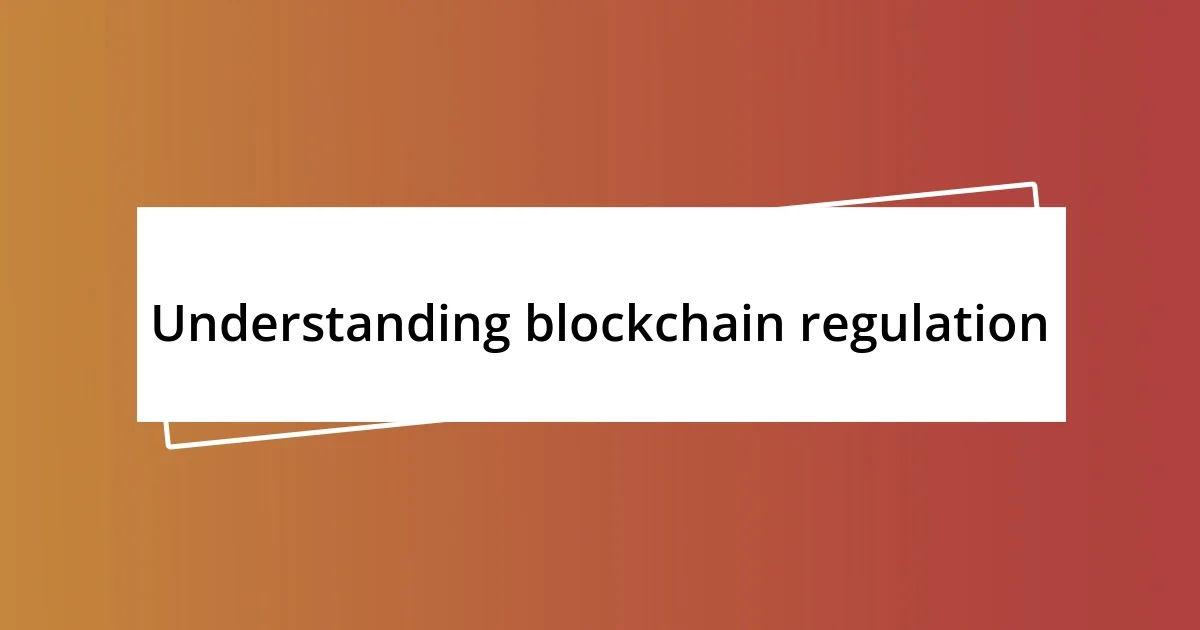
Understanding blockchain regulation
Understanding blockchain regulation is crucial, given the rapid growth of this technology. When I first delved into the world of blockchain, I was both fascinated and overwhelmed. I wondered, how can such an innovative system coexist with traditional regulatory frameworks? It turns out that it’s not just about keeping pace; it’s about finding ways to protect consumers while allowing innovation to flourish.
As I explored various regulatory approaches, I realized that the challenge lies in balancing flexibility and security. For instance, I think about how certain regulations can stifle creativity. Have you ever had a great idea, only to realize it might be too risky or non-compliant? That’s a dilemma many innovators face in the blockchain space. How do we ensure that the regulation promotes growth rather than hampers it?
In my experience, engaging with stakeholders—from developers to regulators—creates a broader understanding of the implications of blockchain. When regulations are developed collaboratively, they are more likely to address real concerns without bending the technology’s transformative power. It often makes me hopeful to see efforts toward creating a regulatory environment that adapts as swiftly as the technology itself. Can we envision a future where that harmony exists?
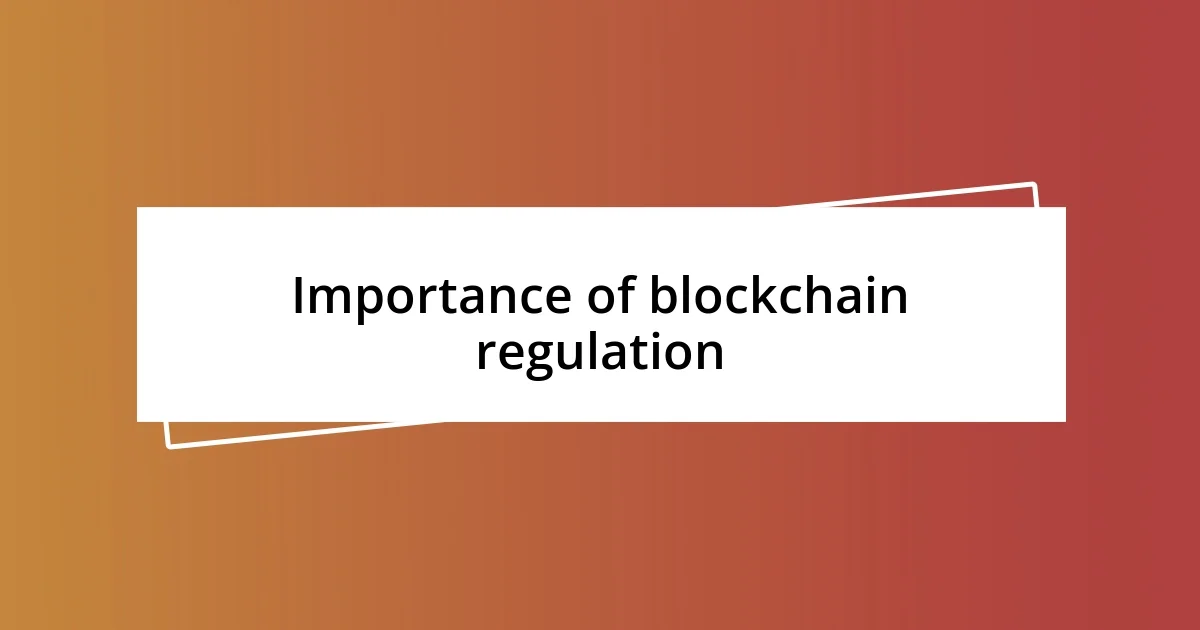
Importance of blockchain regulation
The importance of blockchain regulation can’t be overstated. I remember attending a blockchain conference, where discussions centered on the need for robust regulations to curb fraud and protect investors. It was eye-opening to witness firsthand just how many people are drawn to the crypto world, often without a full understanding of the risks involved. Through regulations, we can cultivate a safer environment that not only protects these newcomers but also lends credibility to the entire blockchain ecosystem.
Another aspect that stands out to me is the potential for regulations to foster innovation. I clearly recall a project pitch I was involved in that struggled to secure funding due to regulatory uncertainties. Investors were hesitant, fearing what future regulations might bring. Had there been clearer guidelines, I believe we would have seen more creativity and investment flowing into promising ventures. Regulations can provide the stability that encourages innovation, allowing new ideas to flourish instead of remain locked away due to uncertainty.
Ultimately, thoughtful blockchain regulation can pave the way for mainstream adoption. I often think about the conversations I’ve had with traditional finance professionals who remain skeptical about blockchain. Their concerns often revolve around security and compliance. However, when we reflect on the opportunities regulation can present in encouraging transparency and accountability, it becomes clear that a well-defined regulatory framework is essential for bridging that gap. How do you perceive the balance of innovation and regulation in blockchain?
| Aspect | Impact of Regulation |
|---|---|
| Consumer Protection | Reduces fraud and enhances investor confidence |
| Encouragement of Innovation | Provides a stable environment for new projects to thrive |
| Mainstream Adoption | Paves the way for traditional industries to engage with blockchain |

Current global regulatory landscape
The current global landscape for blockchain regulation is both diverse and evolving. I’ve observed firsthand how countries approach this technology uniquely, often reflecting their economic priorities and cultural values. For instance, while the United States has focused on securities laws to govern initial coin offerings, other nations like Switzerland have positioned themselves as crypto-friendly havens, offering clear frameworks that invite innovation. It’s fascinating to see how these varying strategies influence the market and shape blockchain’s future.
Key points in the global regulatory landscape include:
- United States: Focus on defining whether cryptocurrencies qualify as securities.
- European Union: Initiatives like the MiCA (Markets in Crypto-Assets) proposal aim for a comprehensive regulatory framework.
- China: A crackdown on cryptocurrencies but a push for Central Bank Digital Currency (CBDC).
- Japan: Pioneer in regulating cryptocurrencies, creating a structured and respected environment.
- Switzerland: A regulatory framework that encourages innovation while ensuring compliance.
Reflecting on my interactions with international developers, I often sense a mix of frustration and hope. The inconsistency in regulation can lead to confusion about where to establish operations. Yet, it also pushes innovators to think creatively, navigating this patchwork landscape in search of opportunity.
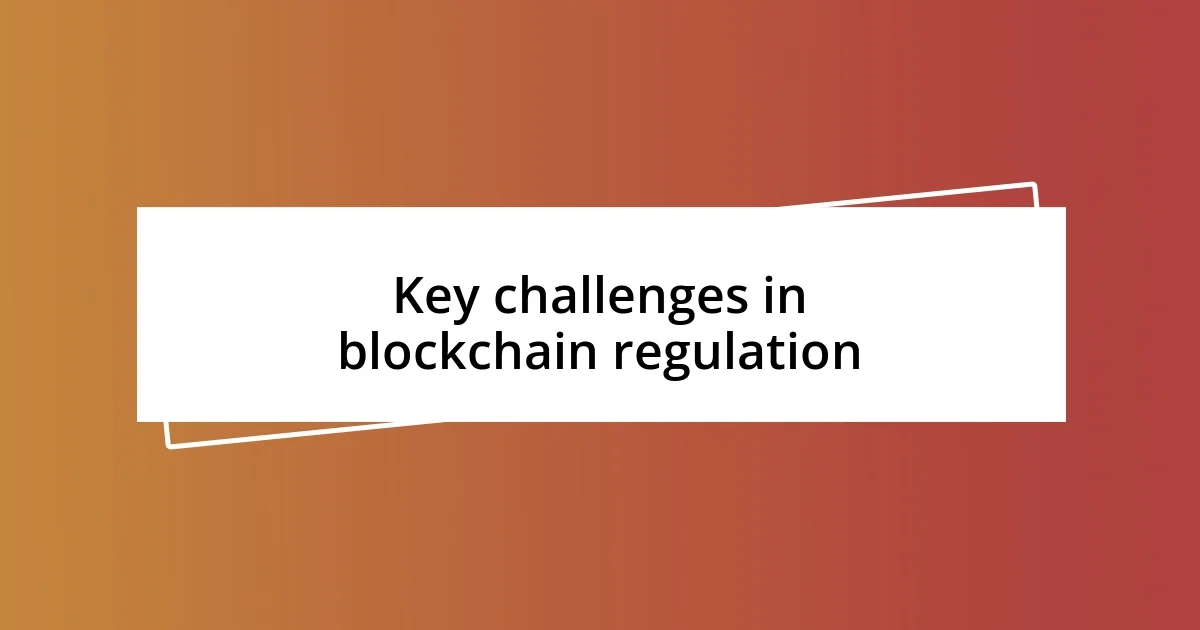
Key challenges in blockchain regulation
One of the key challenges I’ve noticed in blockchain regulation is the lack of uniformity across different jurisdictions. I’ve encountered many projects that faced significant delays simply because they were unsure which country’s regulations they had to comply with. This confusion can stifle innovation, making companies hesitant to launch or invest in blockchain technologies. Who wants to navigate a maze of laws that could change overnight?
Another major hurdle is the rapid pace of technological advancement in the blockchain space, which often outstrips existing regulatory frameworks. I recall a frustrating conversation with a startup founder who had developed an innovative decentralized finance (DeFi) application. They were concerned that by the time regulations catch up, their product would be outdated. It’s a stark reminder that regulators need to be agile and proactive rather than reactive to ensure they don’t hinder progress.
Then there’s the inherent complexity of blockchain technologies themselves. During my education in blockchain, I realized that many regulators might not fully grasp the technical aspects. When discussing the intricacies of smart contracts at a regulatory meeting, I could see the puzzled expressions. If regulators lack a clear understanding, how can they create effective and relevant policies? This gap in knowledge could lead to overregulation or misdirected policies that do more harm than good.
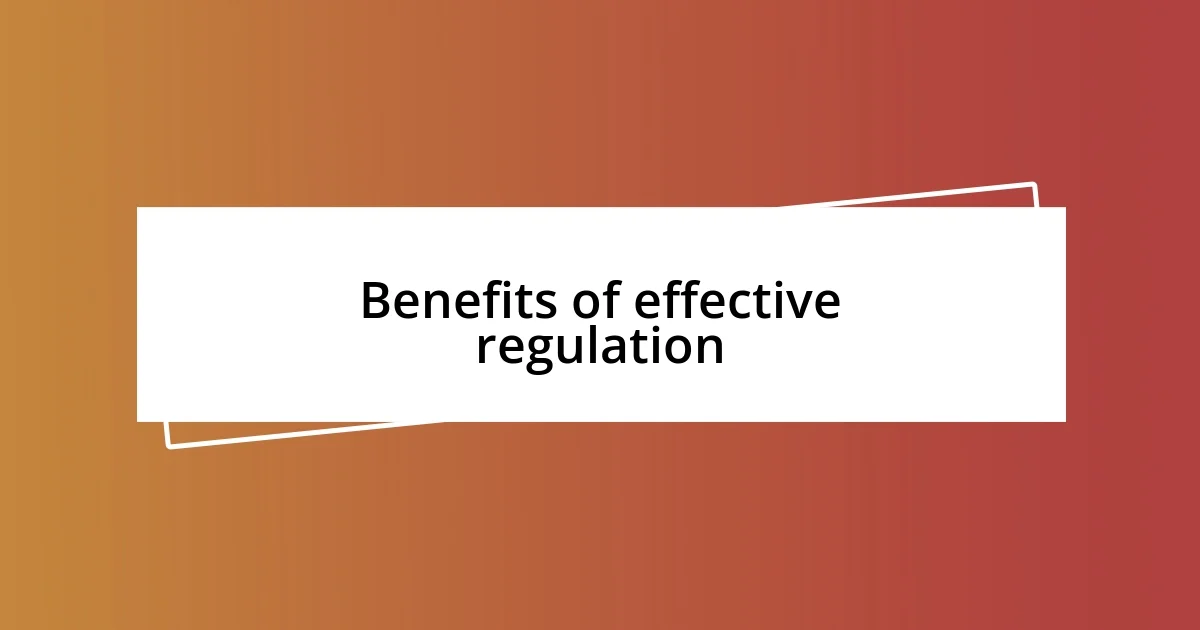
Benefits of effective regulation
Effective regulation can lay a strong foundation for the blockchain ecosystem, fostering trust and encouraging participation from both businesses and consumers. I remember attending a blockchain conference where a regulatory expert shared how clear guidelines can significantly enhance confidence in new technologies. It was eye-opening to see that when participants feel secure, they’re more likely to invest time and resources in innovative projects.
Moreover, effective regulations help shield the market from fraudulent activities, promoting a healthier environment for everyone involved. During a workshop I led, a developer shared the challenges they faced from scams and unregulated practices in the space. I realized that by establishing clear standards and accountability, we can protect not just the innovators but also the unsuspecting users who might fall victim to deception.
Ultimately, robust regulation can stimulate innovation and collaboration across sectors. I once spoke with a fintech entrepreneur who emphasized how a supportive regulatory framework allowed them to collaborate with traditional banks. It struck me that when regulators create a conducive environment, they can fuel partnerships that benefit the entire financial system, driving progress and enhancing user experiences.

Future trends in blockchain regulation
As I look ahead, one noticeable trend is the increasing emphasis on global collaboration in blockchain regulation. I’ve seen a shift where countries are beginning to realize that uniformity can benefit everyone involved. Why should technology be held back by borders when its very essence is about decentralized global interaction? I believe that cooperative efforts can serve as a driving force in establishing standards that protect users while also fostering innovation.
Another emerging trend is the focus on consumer protection and ethical considerations. I had an eye-opening discussion with a compliance officer who emphasized that regulators are starting to prioritize protecting users over merely imposing restrictions on innovation. It’s refreshing to witness this perspective shift, as it recognizes that an informed and secure user base is crucial for the industry’s growth. Could regulations that empower users and enhance their experience lead to greater adoption? I certainly think so.
Lastly, I expect to see innovations in regulatory technology, or RegTech, which can streamline compliance processes for blockchain businesses. During a recent panel, I heard about startups creating AI-driven solutions that help companies navigate complex regulatory landscapes. It got me thinking: if technology can make compliance easier, might we see a surge in innovation as entrepreneurs can focus more on development rather than bureaucratic hurdles? This intersection of technology and regulation excites me, as it could pave the way for a more vibrant blockchain ecosystem.
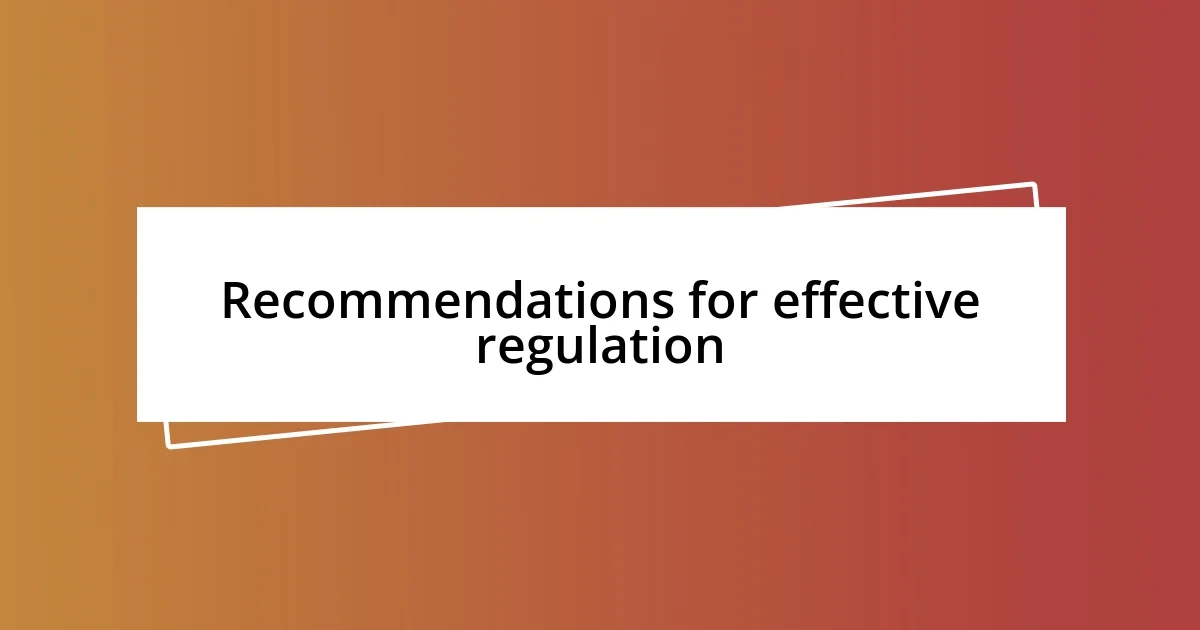
Recommendations for effective regulation
One key recommendation for effective blockchain regulation is to engage stakeholders in a dialogue before finalizing any regulations. I recall a roundtable discussion I participated in where regulators, developers, and users exchanged ideas and concerns. The atmosphere was electric, filled with differing perspectives that highlighted the complexities of blockchain technology. This type of engagement not only builds trust but also ensures that regulations are comprehensive and address the needs of all parties involved.
Another suggestion is to adopt a flexible regulatory framework that can adapt to the rapid evolution of blockchain technologies. I remember chatting with a startup founder who expressed frustration over rigid regulations that felt outdated even before they were implemented. If we can design regulations that allow for experimentation and adjustment, it will foster a culture of innovation rather than stifle it. How often have we seen great ideas squashed by regulatory bottlenecks? A more dynamic approach could change that narrative.
Education and awareness campaigns are also critical. I once attended a forum where a regulator passionately explained the importance of user education in adopting new technologies. It struck me then that if users understand the benefits and risks associated with blockchain, they would be more likely to embrace it. By investing in educational initiatives, regulators can create a well-informed community that not only understands compliance but advocates for best practices in the blockchain space. What if we prioritized education as much as regulation? The potential impact is tantalizing.














